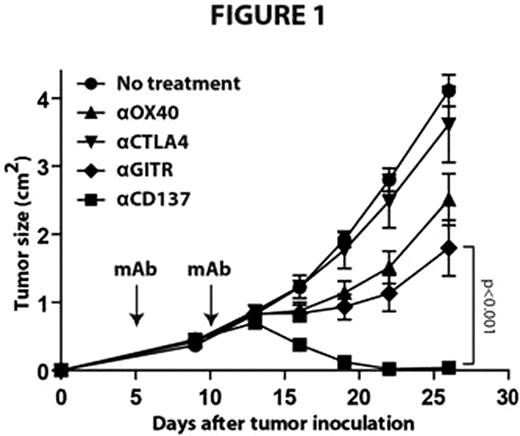Abstract
Abstract 722
Immunomodulating monoclonal antibodies (mAb) directed against immune cell targets can be used to enhance antitumor immune responses. CD137 (4-1BB) is a costimulatory molecule expressed on a variety of activated immune cells, including T and NK cells. Anti-CD137 agonistic mAb has demonstrated antitumor activity in various tumor models and has now entered clinical trials for the treatment of solid tumors (BMS-663513). Here, we investigate the therapeutic potential of anti-CD137 mAb in lymphoma.
Using microarray gene expression data, we compared CD137 mRNA expression across 17 different types of cancer. We found that lymphoma tumor specimens significantly over-expressed CD137 mRNA compared to other tumors (p<0.0001). Single cell analysis of primary lymphoma samples of various histologies (follicular lymphoma [n=29], mantle cell lymphoma [n=14], and diffuse large B cell lymphoma [n=11]) revealed that CD137 was expressed by a significant proportion of tumor-infiltrating T cells, particularly in the CD8 subset (mean[range]=6.1%[2.5-11.5], 15.4%[2.7-40.9] and 18.7%[6.7-51.7], respectively). In contrast, CD137 was not expressed by the tumor cells. These results suggest that the target of anti-CD137 mAb is present and selectively expressed on cells with potential antitumor activity in patients with lymphoma.
Using a murine model, we then investigated the anti-lymphoma activity of anti-CD137 agonistic mAb in vivo. BALB/c mice, bearing large and established A20 lymphoma tumors, were treated with anti-CD137 mAb or other immunomodulating mAbs (anti-OX40, anti-CTLA4, anti-GITR) for comparison. The mAbs were given i.p. on days 5 and 10 post tumor inoculation. Anti-CD137 mAb demonstrated potent anti-lymphoma activity in vivo, and appeared to be significantly superior to the other immunomodulating mAbs tested (Figure 1). The antitumor effect of anti-CD137 mAb was not due to direct targeting of the malignant cells as A20 tumor cells do not express CD137.
Depletion experiments revealed that anti-CD137 therapy required both NK and CD8 T cells. Analysis of tumor-bearing mice showed that anti-CD137 therapy increased the number of CD8 T cells and reduced the number of Tregs at the tumor site. Anti-CD137 therapy also induced long-lasting antitumor immunity as cured mice harbored antitumor IFN-g producing memory CD8 T cells and were protected from tumor re-challenge more than 100 days after initial therapy.
In conclusion, this study demonstrates for the first time that anti-CD137 agonistic mAb has potent antitumor activity in lymphoma. These results support the evaluation of anti-CD137 mAb in clinical trials for patients with lymphoma.
No relevant conflicts of interest to declare.
Author notes
Asterisk with author names denotes non-ASH members.


This feature is available to Subscribers Only
Sign In or Create an Account Close Modal